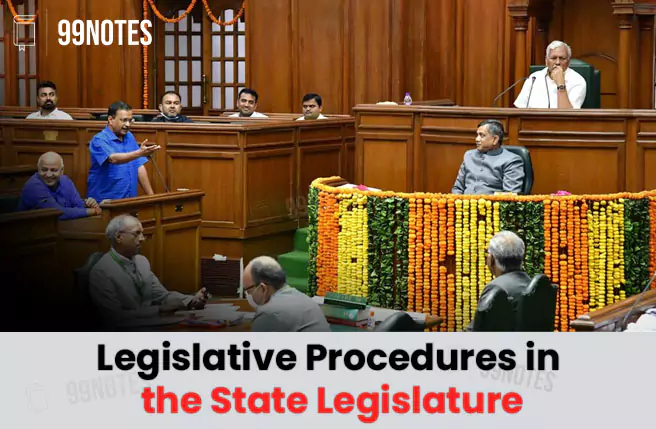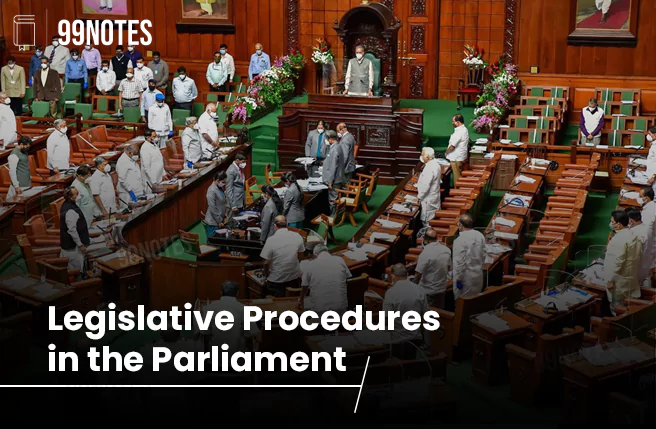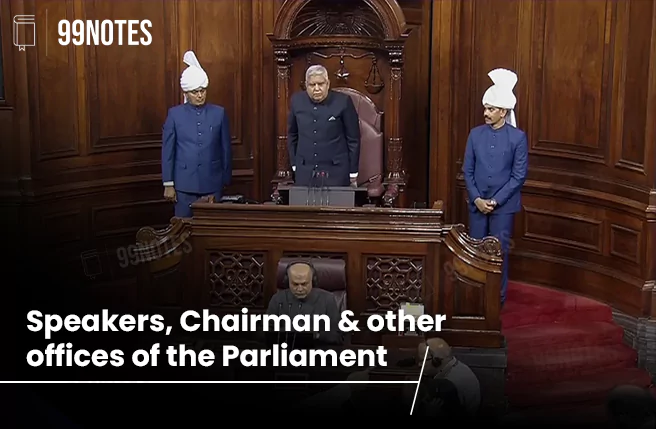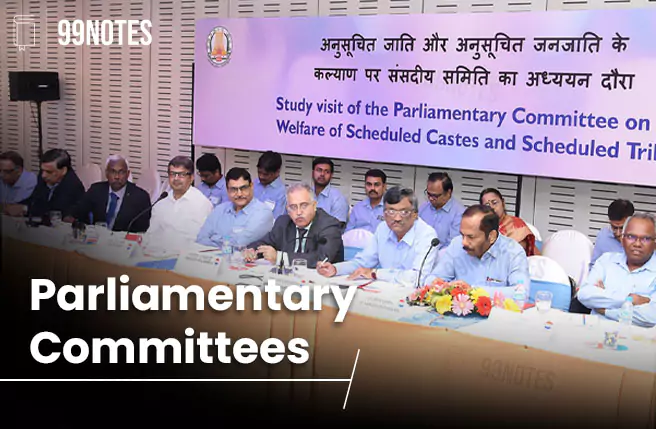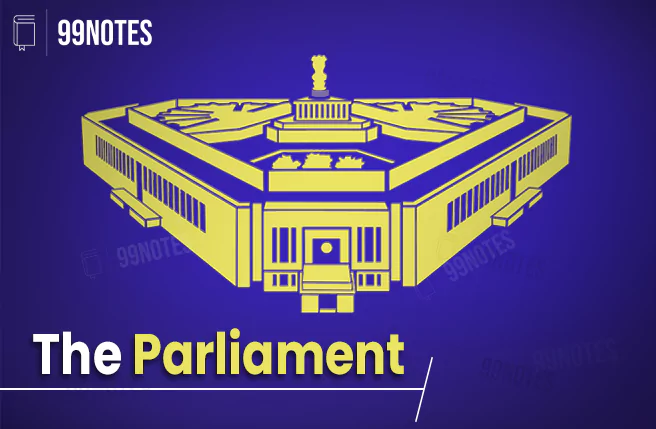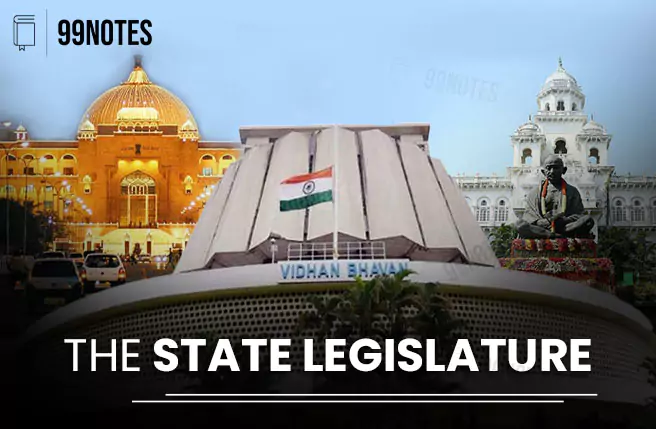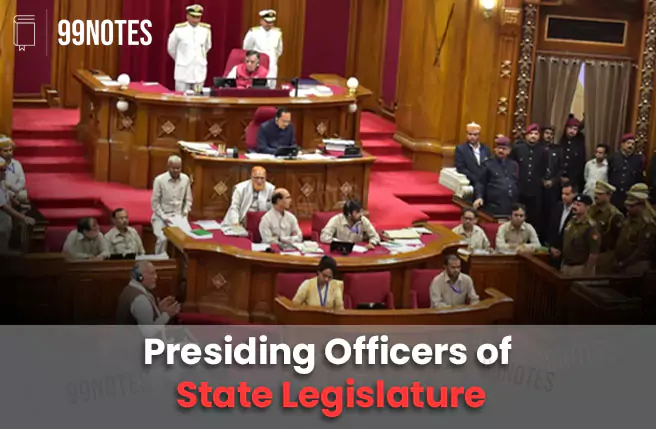Legislative Procedures in the State Legislature – UPSC Notes
The legislative procedure in the state legislature is somewhat similar to the procedure in the Parliament; however, since the Legislative Council has much fewer powers as compared to the Rajya Sabha, there are some differences in the legislative procedure in the state legislature, which we will discuss here:
1) Regarding Ordinary Bill
- Introduction: The bill can be introduced in either of the houses (in case of a bicameral legislature). It can be introduced by either a minister or any private member.
- Stages of the bill: Like in the case of Parliament, the bills here, too, go through the same 3 stages:
-
- First Reading
- Second Reading
- Third Reading
- Passage of the bill: After the bill is passed in the first House, the bill is transmitted to the second House (in case of bicameral legislature) for consideration. However, in the case of a unicameral legislature, after the Legislative Assembly passes the bill, it is sent to the Governor for their assent.
- Bill in the Second House: In the second House, the bill goes through the same process, i.e. the first reading, the second reading and the third reading.
Procedure in case the bill is transmitted to the Legislative Council
When the bill is initiated and passed in the Legislative Assembly and the bill is transmitted to the Legislative Council, it has the following options:
- It may pass the bill without amendments;
- It may pass the bill with amendments and send the bill to the Assembly for reconsideration;
- It may reject the bill outright;
- It may refuse to act and keep the bill pending.
Scenario-1: If the Council passes the bill without amendment, it is considered passed by both the Houses, and it is sent to the Governor for assent.
Scenario 2: If the Council passes the bill with amendment, and the Assembly accepts the recommendation, it is considered passed by both Houses with modification and is sent to the Governor for assent.
Scenario-3
- If the recommendation of the Council is rejected by the Assembly or the Council rejects the bill or keeps the bill pending for 3 months, then the Assembly may pass the bill again and send it to the Council.
- If the Council again passes the bill with amendments (which is not accepted by the Assembly), or rejects the bill or takes no action for one month, then the bill is considered passed in the form the Assembly had passed for the second time.
Assent of the Governor
After the bill is passed by the Assembly or, in the case of a bicameral legislature, it is passed by both Houses; the bill is then sent to the Governor for assent. In this situation, the Governor has the following alternatives:
- S/he may give assent to the bill; in that case, the bill becomes law;
- S/he may withhold the assent, in which case the bill fails to become a law (Absolute veto);
- S/he may return the bill, but If the State Legislature passes the bill in its original shape or in a modified form, the Governor has to give assent to the bill (Suspensive veto);
- S/he may reserve the bill for the consideration of the President.
Assent of the President
When the bill is reserved for the President’s consideration by the Governor, the President has the following alternatives:
- S/he can send back the bill for reconsideration by the state legislature; the state legislature must reconsider it within 6 months;
- If the bill is again passed by the state legislature, it is again presented to the President (the Governor’s role regarding that bill ends after s/he reserves it for the President’s assent).
- The President is not bound to give assent even after the bill is sent again for reconsideration (The Constitution is silent on this provision).
2) Regarding Money Bill
A money bill is legislation that only contains the subjects mentioned in Article 199 (related to taxation and appropriation of funds).
- Introduction: A money bill can be introduced in the legislative Assembly only, and that too with the prior recommendation of the Governor. It is considered a government bill and hence can be only introduced by a minister.
- Passage of the bill: In the case of unicameral legislature, after the bill is passed, it is sent to the Governor for assent. However, in the case of a bicameral legislature, after passing the bill in the Legislative Assembly, it is transmitted to the Legislative Council.
- Bill in the second House: With respect to money bills, the Council has restricted powers. It cannot amend or reject the bill. It can only make recommendations and must send back the bill within 14 days.
- The legislative Assembly can accept or reject the recommendations of the Legislative Council. If the Assembly accepts the recommendations, then the bill is considered passed by both the Houses in modified form; if not, then it is considered passed by both the Houses in its original form.
- If the Assembly does not return the bill within 14 days, then the bill is considered passed in its original form.
- Restricted powers of Legislative Council: Hence, the legislative powers of the Council are even more restricted with respect to money bills. Maximum, it can delay the bill for 14 days.
- Assent of the Governor: Finally, the bill is presented to the Governor for their assent. S/he may either give their assent or withhold the assent but cannot return the bill for reconsideration.
- Assent of the President: If the Governor reserves for the President’s consideration, the President can either grant assent or withhold the assent but cannot reject the bill.
Difference between Legislative Procedure in Parliament and state Legislature
| Parliament | State Legislature |
| With Respect to Ordinary Bills | |
| When the second House rejects a bill or proposes amendments that are not acceptable to the first House or does not act for 6 months, it creates a deadlock. | When the Legislative Council, after receiving the bill from the Assembly, rejects the bill or proposes amendments that are not acceptable to the Assembly or does not act for 3 months, it creates a deadlock. |
| In conditions of deadlock, there is a mechanism of joint sitting of both houses to resolve the deadlock. | Here, there is no mechanism of joint sitting. |
| The Lok Sabha cannot override the Rajya Sabha by re-passing the bill; the deadlock can only be resolved through joint sitting. | Here, the Assembly can override the Council by re-passing the bill. When the re-passed bill is rejected by the Council, or amendments that are unacceptable to the Assembly are proposed, or the bill is kept pending for 1 month, then the bill is considered passed. |
| If a bill is initiated in Rajya Sabha and rejected by the Lok Sabha, then the provision of joint sitting can be exercised. If not, then the bill ends. | If a bill initiated in the Council is rejected by the Assembly, the bill ends. |
| In the case of a Money Bill | |
| In the case of the Money bill, both the Rajya Sabha and the Legislative Council have similar restrictions. | |
Concerns Related to the Functioning of the State Legislature
- Decreasing number of sitting days: The number of sessions of state legislatures varies across states. In 2021, state legislatures, on average, sat for only 21 days (PRS).
- Hasty passing of bills: Debate and discussion on a bill is one of the most crucial aspects of parliamentary democracy. With a decreasing number of meetings and increasing disruptions, bills are being introduced, considered and passed in a hurried manner. For example- in Gujarat Assembly during 2018-22, 91 out of 92 Bills introduced (excluding Appropriation Bills) were passed on the same day.
- Decreasing the role of committees: Sending legislation to committees allows a detailed examination of legislation. These committees also seek the opinions of experts and the public. However, increasingly, a lesser number of bills are being sent to the committees. For example- In 2021, only around 40 out of more than 500 Bills passed by state legislatures (excluding Appropriation Bills) were referred to committees. Even when bills are sent, in many cases, such committees are headed by ministers, which defeats the purpose of independent examination of bills.
- Issues related to subordinate legislation: After the bill is passed, the rules and regulations are made by the government. These rules and regulations are scrutinised by a committee comprised of members of the state legislature. However, reports of such committees are rarely discussed.
- Financial accountability: The state legislature is the custodian of public money in a state. However, increasingly, the demand for grants is being passed by way of guillotining without conducting sufficient discussion. The state legislatures also lack department-related standing committees, which exist in Parliament.
- Resource constraint: The legislative functioning of the state legislature is also marred by the resource constraints in the legislature secretariat. It affects the ability of the secretariat to help the legislature gather information, facts, research work, etc. It also affects the publication of relation reports and legislative work in public.
Way forward
- There is a need to provide a greater say to the opposition in deciding the number of sessions and number of sitting days in the legislature. Best practices of other countries can also be adopted; for example- In the UK, the opposition parties get 20 sitting days a year to set the agenda. As per the recommendation of the National Commission to Review the Working of the Constitution (NCRWC), state assemblies with fewer than 70 members should meet for at least 50 days a year, and assemblies with more members should meet for at least 90 days.
- It can be made mandatory for all bills to be sent to a committee. In the UK, every bill (except a money bill) is automatically sent to a committee, and the bill cannot be passed unless the report of the committee is not discussed in the House of Commons.
- Department-related standing committees should be established in all state legislatures to scrutinise the demand for grants.
- As per the recommendation of NCRWC, capacity building and upgradation of the legislature secretariat should be undertaken.

